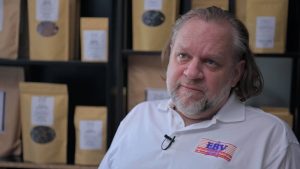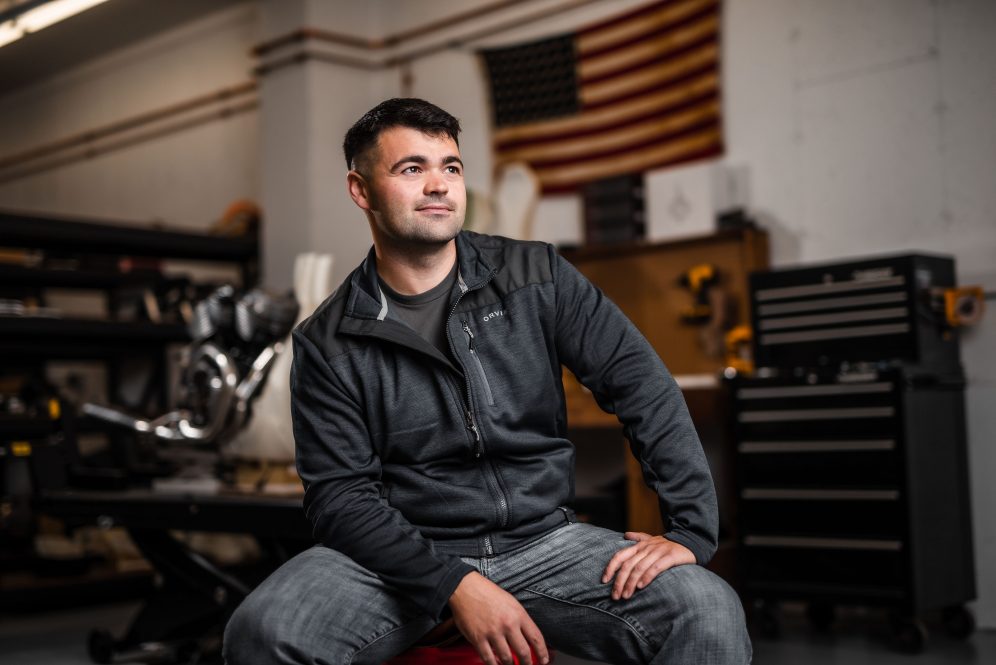United States Marine Corps veteran Tony Audette builds custom motorcycles for celebrities, business titans, and other enthusiasts who want a bike that’s unlike any other. His exclusive motorcycles sell for upwards of $130,000.
After two years in business, Audette Motorcycles, in Canton, is thriving. Audette credits much of his business knowledge and expertise to the School of Business’ Entrepreneurship Bootcamp for Veterans (EBV). The startup accelerator steered him away from several costly business mistakes, he said.
“It takes a lot of naivete to start a business, and a lot more grit to stick with it,’’ says Audette, the company founder and president, who served a nine-month combat tour in Afghanistan.
“The EBV took all the guesswork out of it. If I didn’t take this course, it would have taken me years to figure it out on my own,’’ he says. “The EBV has been priceless for me.’’
Veterans’ Program Needs a Helping Hand
The EBV program, founded at UConn in 2009, offers experiential training in entrepreneurship and small-business management to post-9/11 U.S. veterans who have disabilities as a result of serving the country. The UConn program has graduated 218 veterans and their caregivers, who have launched 187 businesses.
The COVID-19 pandemic threw a wrench in the program, which relies on gifts, grants, and philanthropy to provide its services at no cost for veterans. “We’ve had some difficult and uncomfortable conversations,’’ says EBV Director Michael Zacchea, who feared the program wouldn’t continue.
UConn finance professor emeritus Tom O’Brien, a longtime supporter of the program, stepped up with a plan to encourage potential donors to contribute. He offered to match donations, up to $100,000, to help save the program.

“This program just rang a bell with me,’’ says O’Brien, of Southington, who taught at UConn for 30 years and led the school’s finance-degree program. “I was distraught by how many veterans were returning from Iran and Afghanistan both physically and emotionally wounded. The EBV program has had spectacular success in the number of people who started a successful business. But, to me, this is also a life-saving program.’’
“I feel these men and women served in a combat zone, they did this for their country and I don’t want them to give up,’’ he says. “Every person who goes through the program is another suicide prevented. These people deserve better because of what they’ve done for us.’’
School of Business Dean John A. Elliott says the program is inspiring.
“The UConn EBV program is one of the most respected and celebrated programs of its kind in the nation,’’ Elliott says. “It touches many hearts to be able to help those who have sacrificed so much for our nation. Not only are these new entrepreneurs creating something exciting for themselves, but also contributing to the growth of our economy.
“I am hopeful that, through the generosity of Professor O’Brien, additional donors, and the state of Connecticut, we will be able to keep this valuable program on solid footing,’’ he says.
Despite End of War in Afghanistan, Next Decade Will be More Challenging
The program is run by Zacchea, a combat-wounded, medically-retired U.S. Marine Corps lieutenant colonel, who deployed as the first U.S. military adviser during the war in Iraq. He was awarded two Bronze Stars for valor in combat and the Purple Heart for his wounds. This Veteran’s Day will mark the 17th anniversary of a wound that nearly cost him his life. He tells his harrowing story in the war memoir “The Ragged Edge: A U.S. Marine’s Account of Leading the Iraqi Army 5th Battalion.’’
Despite the end of the U.S. military presence in Afghanistan, Zacchea thinks the need for the EBV program will continue to increase.
“I think the next decade will be tougher than the last. It isn’t over because the war in Afghanistan is over. The needs of those who serve will increase over time, as will the demand for our services,’’ he says. Due to chemical exposure, poor air quality, and other issues, today’s veterans are likely to experience more long-term illnesses than their predecessors.
The EBV program has also changed, with a stronger emphasis on developing technology skills and a focus on an older veteran who likely served several tours of duty.
“They’ve experienced different barriers to employment, including ageism on top of everything else,’’ Zacchea says. “They’re not at the point where they’re seeking entry-level positions. They have experience and competence.’’
“This program has not only been an economic generator, it has put Connecticut and UConn on the map for veteran entrepreneurship,’’ Zacchea says. The program has drawn bipartisan support at the federal and state level and its leadership has been involved in the development of national veteran policy.
Zacchea still hears from people who graduated in the inaugural class of 2010, many of whom have remarkable success stories both in business and in life. “There are very few causes that can rebuild our country and our economy like this one can,’’ he says. “It is a return on investment and a great feeling.’’
‘I Went In With the Idea of Learning What I Didn’t Know’
Audette returned from active duty more than five years ago, after serving as a medium- and heavy-machine gunner. He earned a college degree while worked in engineering and manufacturing in the firearms and aerospace industries. He later found a job at a motorcycle manufacturer, where he honed his knowledge of the business.

He had just started Audette Motorcycles in a small, unheated garage in Canton in 2019, when he was contacted by EBV about his interest in joining the program.
Audette says the Marine Corps taught him valuable skills, including focus, discipline, and the willingness to go the extra mile to pursue a goal. From his parents, he learned to be open to new ideas and innovation.
And from the EBV program he and his cohort tried to “siphon every bit of knowledge we could in the time we had with each instructor.’’
“We, as veterans, have all had to do a job where our own, or someone else’s, life has depended on us. Everyone knows that when you run your own business, your life and others’ lives depend on you, too, and how well you can run and manage the business,’’ he said. “We also understand the magnitude of the opportunity to take the class, especially at the UConn School of Business. Everyone is engaged, asking questions, asking for clarification—really learning.’’
“I’m incredibly grateful to have been able to attend the EBV course. The program itself dips your toes into the water in every area of business, ensuring that we all have a solid foundation in which to start, and to reference back to as needed. From patents, basic accounting, bookkeeping, how to present our businesses, mental health, sales, marketing and IT, the course is comprehensive, well-choreographed and well-executed.’’
He learned beside beekeepers, landscapers, theater directors, security-force founders, clothing designers, waste-removal experts, engineers, community farmers, coffee-shop owners, and more.
“In a matter of a week, we were all confident that we had gained the solid footing that every budding entrepreneur is desperately searching for.’’
Audette Motorcycles is committed to innovative, timeless designs that mix engineering and artistry. His clientele, predominantly middle-aged men, have the time and money to enjoy their hobby.
“They want something that’s totally unique and catered to them. That level of exclusivity gives them confidence when they ride,’’ he says. “They want to select the color and finish and hand-pick the leather. They like knowing there isn’t going to be another out there identical to their own.’’
The motorcycles typically take several months to build and most of Audette’s business comes from word-of-mouth. It is a company that has allowed him to merge his personal interest and his professional passion.
“I’m not the stereotypical biker. I have no preference on which brand is best, I’m not a fan of clubs and all the extra nonsense. I want a great bike and road to ride with no one else on it,’’ Audette says. “But I also have no problem sitting and looking at a different motorcycle designs, thinking through the decisions the engineer/designer made and why.
“You open a business because you love what you do and, hopefully, you’re the best at it,’’ he says. “I went into the EBV with the idea of learning what I didn’t know—from accounting to taxes from trademarks to patents.’’
But through the program, he also found a deep camaraderie that had been missing from his civilian life.
“Being in the class with other veterans was incredible. I went to college with other great people, but that dude wasn’t a machine gunner in Afghanistan,’’ he says. “It is a sense of relief to know everyone has been through similar experiences as you. There’s no stigma. I appreciated that everyone cares significantly. We’ve all been selected, we’re all very serious about starting our business, growing our business and learning. I keep in touch with many of the people from my class.’’
Contributions to the EBV program can be made here: www.foundation.uconn.edu/fund/veterans-outreach-at-the-school-of-business-ebv. Donors who contribute $200 or more will receive an autographed copy of Zacchea’s book, “The Ragged Edge: A U.S. Marine’s Account of Leading the Iraqi Army 5th Battalion.’’



